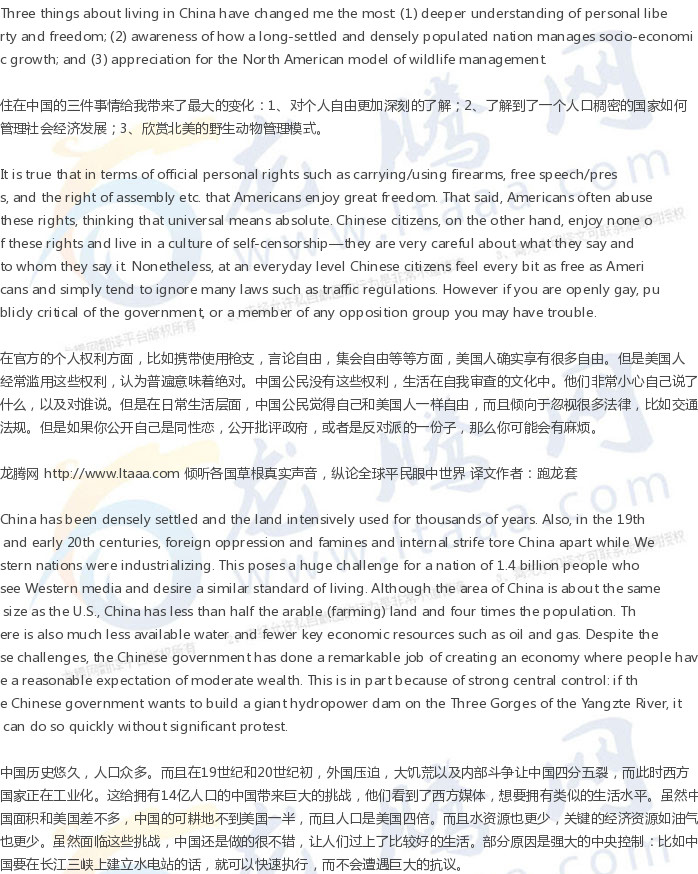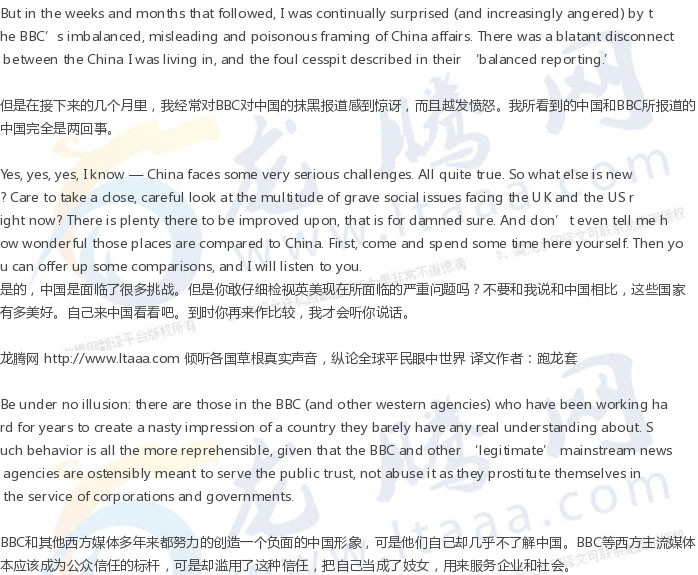住在中国如何改变了你? [美国媒体]
quora网友:我在中国的体验主要是根据我在三个不同的中国城市里做客座教授期间的生活和教书经历,分别是重庆,银川和广州。我还去过十几个其他城市,还有一些偏远区域,比如宁夏农村,云南山区,张家界等等......
How has living in China, changed you?
住在中国如何改变了你?
Pat Munday, Professor of Science & Technology Studies (1990-present)
Answered 21h ago
My experience in China is based on living and teaching as a visiting professor at universities in three Chinese cities: Chongqing in “southwest” China, Yinchuan in “northwest” China, and Guangzhou on the southeast coast. I have also visited a dozen or so other cities and some remote regions such as rural Ningxia, the mountains of Yunnan, Zhangjiajie, etc. [I use air quotes on southwest and northwest because, looking at a map, we would think of these cities as southern- or northern-middle. However, in Chinese culture, the true southwest (Tibet) or northwest (Xinjiang) are pretty much off the cognitive map.)
我在中国的体验主要是根据我在三个不同的中国城市里做客座教授期间的生活和教书经历,分别是重庆,银川和广州。我还去过十几个其他城市,还有一些偏远区域,比如宁夏农村,云南山区,张家界等等。
As an environmentalist, I sought out national parks and other natural areas in China. While these areas are geologically amazing and sometimes have relatively intact plant ecosystems, they are largely devoid of bird, animal, and fish life. A few iconic species such as the pandas of Sichuan, the blue sheep (bharal) of Tibet, and the giant salamander are heavily protected and managed in select areas, most of the wild native species that inhabited China a thousand years ago are gone. Some Chinese people care about wildlife, but most don’t care and don’t notice. And they tolerate the sale of traditional medicines such as tiger’s paws and pangolin scales in the local markets. Most Chinese are simply not connected with nature as many Americans are through birdwatching, hunting, fishing, and other nature activities.
作为一个环境保护者,我去了中国的国家公园和其他自然区域。虽然这些地方在地理上相当惊艳,有时也拥有相对完整的植被生态系统,但是大体上缺乏鸟类,动物和鱼。一些象征性的物种比如四川的熊猫,西藏的岩羊,娃娃鱼都在限定的区域里被严密保护着,大部分1000年前就居住在中国的本地野生物种已经消失。某些中国人关心野生动物,但是大部分人不关心,也不关注。而且他们容忍传统药物在当地市场里的销售。比如虎爪和穿山甲。大部分中国人没有和大自然连结在一起,但是美国人会通过观鸟,狩猎,钓鱼和其他自然活动和大自然连接一起。
Clive Green, lives in China (2007-present)
Answered Nov 13
Well, after living here for 11 years, I’ve learned to completely distrust western mainstream news media accounts of China.
Before coming to the PRC, I used to feel rather superior about the ‘fair and balanced’ news reporting from the BBC. They often portrayed China as a frequently filthy, backward and nasty place. And this was in 2007. Needless, to say, I was filled with considerable trepidation upon my arrival.
已经在中国居住11年了,我发现西方媒体对中国的报道完全不可信。在来中国之前,我对BBC“公正不偏袒”的新闻报道感到相当骄傲。他们经常将中国报道为一个肮脏落后的地方。那是在2007年。毫无疑问,我刚踏上中国时内心是充满恐惧的。
Roger Jiang
Sat • 26 upvotes including Clive Green
Very well said. I had similar experience, but reversed. I went to the US with a naive idea that western mainstream media is "fair, objective and balanced". Boy, was I wrong!
The difference between Chinese and Western mainstream media is that at least Chinese mainstream media is honest about it being propaganda, while the Western mainstream media puts on a deceptive veneer of being "objective and balanced", which could be quite effective on the unsophisticated minds, despite all the much boasted "independent thinking".
Worse still, once those so-called "independent thinking" people can not offer a fact-based and logically coherent argument, they would desperately resort to name calling. Yup, calling the other party WUMAO is sure way to win an argument. So much for the "independent and critical thinking"…
说得好。我有类似的经历,但是是反过来的。我去美国,天真的以为西方主流媒体是公正客观平衡的,可是我错了。中国主流媒体和西方主流媒体的差异在于中国主流媒体承认自己是在宣传,而西方主流媒体戴上客观公正的虚假面具,单纯的人很容易被骗,虽然他们自称拥有“独立思考”能力。
更糟的是,一旦这些所谓的“独立思考”的人们无法提供以事实为依据的逻辑连贯的论证时,他们就会绝望到诉诸人身攻击,称对方为五毛。这就是所谓的“独立和批判性思维”。。。
版权声明
我们致力于传递世界各地老百姓最真实、最直接、最详尽的对中国的看法
【版权与免责声明】如发现内容存在版权问题,烦请提供相关信息发邮件,
我们将及时沟通与处理。本站内容除非来源注明五毛网,否则均为网友转载,涉及言论、版权与本站无关。
本文仅代表作者观点,不代表本站立场。
本文来自网络,如有侵权及时联系本网站。
下一篇: 为什么中国人变得这么物质? [美国媒体]
上一篇: Uber即将崩溃 [美国媒体]
图文文章RECOMMEND
热门文章HOT NEWS
-
1
Why do most people who have a positive view of China have been to ...
- 2
- 3
- 4
- 5
- 6
- 7
- 8
- 9
- 10
推荐文章HOT NEWS
-
1
Why do most people who have a positive view of China have been to ...
- 2
- 3
- 4
- 5
- 6
- 7
- 8
- 9
- 10













